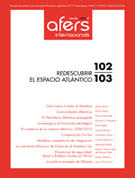Hacia una agenda de gobernanza para el Hemisferio Atlántico emergente
Palabras clave:
cuenca atlántica, Hemisferio Atlántico, energía, comercio, inversión, seguridad humana, gobernanza, globalizaciónResumen
Revista CIDOB d’Afers Internacionals, nº 102-103
Cuatrimestral (2013)
ISSN:1133-6595 | E-ISSN:2013-035X
La cuenca atlántica está resurgiendo como un subsistema importante dentro de la economía política global: corrientes interrelacionadas de personas y energía, dinero y armas, bienes y servicios, tecnología y terrorismo, drogas y delincuencia; mayor acceso recíproco a los mercados, recursos y talento. Pero las crecientes interdependencias generan nuevas vulnerabilidades y retos: cooperación en recursos y conexiones energéticas; promoción del comercio y la inversión; migración e integración; construcción de sociedades resistentes; mejora de la buena gobernanza; inversión en desarrollo humano; y lucha contra las organizaciones criminales transnacionales y sus crecientes vínculos con terroristas e insurgentes.
Aunque los mecanismos de gobierno y cooperación diplomática panatlánticos todavía están en sus inicios, una serie de hechos sugieren que es posible una cooperación hemisférica amplia y entrelazada. De hecho, la cuenca atlántica puede emerger como un laboratorio mundial para una gobernanza interregional e interconectada entre países desarrollados y países emergentes.
Citas
Aning, Kwesi. Security Links between Trafficking and Terrorism in the Sahel in Africa South of the Sahara. Londres: Routledge, 2011.
Bergsten, C. Fred. «Open Regionalism». Documento de trabajo 97-3, Institute for International Economics. Washington, DC, 1997.
Collier P y A. Venables. «Rethinking Trade Preferences: How Africa Can Diversify its Exports». The World Economy, vol. 30, n.º 8 (2007), p. 1326-45.
Diaz, Robert J. y Rosenberg, Rutger. «Spreading Dead Zones and Consequences for Marine Ecosystems». Science, vol. 321, n.º. 5891 (15 de agosto de 2008), p. 926-929. DOI: 10.1126/science.1156401.
Ecorys, Deltares, Oceanic, 2012. «Blue Growth. Scenarios and drivers for Sustainable Growth from the Oceans, Seas and Coasts». Final Report. Study on behalf of the European Commission, DG MARE (en línea) https://webgate.ec.europa.eu/maritimeforum/content/2946http://ec.europa.eu/maritimeaffairs/policy/blue_growth/documents/com_2012_494_en.pdf
ECOWAS-GIABA; Kofi Annan Foundation; Kofi Annan International Peacekeeping Training Center; New York University Center on International Cooperation. «The Impact of Organized Crime and Drug Trafficking on Governance, Development and Security in West Africa». Expert Meeting Summary of Proceedings, Dakar, Senegal, 18-20 de abril de 2012.
Hamilton Daniel S. y Quinlan, Joseph P. The Transatlantic Economy 2013. Washington, DC: Center for Transatlantic Relations, 2013.
Hamilton Daniel y Rhinard, Mark. «All for one and one for all: towards a transatlantic solidarity pledge». The EU-US security and justice agenda in action. París: European Union Institute for Security Studies, 2011.
Hamilton, Daniel y Volker, Kurt (eds.). Transatlantic 2020: A Tale of Four Futures. Washington, DC: Center for Transatlantic Relations, 2011.
Hinshaw, Drew. «Fast-Growing Label: Made in Ghana». The Wall Street Journal, 1-2 de diciembre de 2012, p. B1.
Herfkens, Eveline. «Harmonized Trade Preferences for Low Income African Countries: A Transatlantic Initiative». Borrador preparado para la Atlantic Basin Initiative. Washington, DC: Center for Transatlantic Relations, abril de 2013.
Ikenberry, G. John. «The Future of the Liberal World Order» Foreign Affairs (mayo/junio de 2011).
International Energy Agency (IEA). Energy for All: financing access for the poor. París: IEA, 2011.
Isbell, Paul. «An Atlantic Agenda for Biofuels». Borrador preparado para la Atlantic Basin Initiative. Washington, DC: Center for Transatlantic Relations, enero de 2013.
– Energy and the Atlantic. The Shifting Energy Landscape of the Atlantic Basin. Washington, DC: German Marshall Fund of the United States, 2012.
Jafee, Amy Myers. «The Americas, not the Middle East, will be the World Capital of Energy». Foreign Policy (septiembre/octubre de 2011).
Kliman, Daniel M. «The West and Global Swing States». The International Spectator: Italian Journal of International Affairs, vol. 47, n.º 3 (2012), p. 53-64.
Lacher, Wolfram. «Organized Crime and Conflict in the Sahel-Sahara Region». Washington, DC: Carnegie Endowment for International Peace, septiembre de 2012.
Lesser, Ian, et al. Morocco’s New Geopolitics. Washington, DC: German Marshall Fund of the United States/OCP Foundation, 2012.
Nellemann, C., Hain, S., y Alder, J. (eds). In Dead Water – Merging of climate change with pollution, over-harvest, and infestations in the world‘s fishing grounds. Noruega: United Nations Environment Programme, GRID-Arendal, febrero de 2008.
Nye, Joseph S. The Future of Power. Nueva York: Public Affairs, 2011.
Østebø, Terje. «Islamic Militancy in Africa». African Security Brief, n.º. 23 (noviembre de 2012). Africa Center for Strategic Studies. (en línea) http://africacenter.org/wp content/uploads/2012/11/AfricaBriefFinal_23.pdf
Page, John. Supporting Africa’s growth turnaround. Washington, DC: Brookings, 2012.
Richardson, John, et al. The Fractured Ocean. Current Challenges to Maritime Policy in the Wider Atlantic. Washington, DC: German Marshall Fund of the United States/OCP Foundation, 2012.
Sallenger, Asbury H., et al. «Hotspot of accelerated sea-level rise on the Atlantic coast of North America». Nature Climate Change, n.º 2 (24 de junio de 2012), p. 884–888. Doi:10.1038/nclimate1597.
Slaughter, Anne-Marie. «America’s Edge. Power in the Networked Century». Foreign Affairs (enero/febrero de 2009).
The Economist. «African democracy. A glass half-full». The Economist (31 de marzo de 2012), p. 57-58.
Vasconcelos, Álvaro de (ed.) Global Trends 2030 - Citizens in an Interconnected and Polycentric World. París: EU Institute for Security Studies, 2012.
Watson R. y Pauly, D. «Systematic distortion in world fisheries catch trends». Nature, n.º 414: (2001), p. 534–536.
Werenfels, Isabelle y Westphal Kirsten, «Solarstrom aus Nordafrika: Rahmenbedingungen und Perspektiven». SWP-Studie, n.º 3 (febrero 2010). Berlín: Stiftung Wissenschaft und Politik.
WTO, World Trade Developments, International Trade Statistics.
Zoellick, Robert. «Five questions for the world’s next trade chief». Financial Times (2 de abril de 2013).













